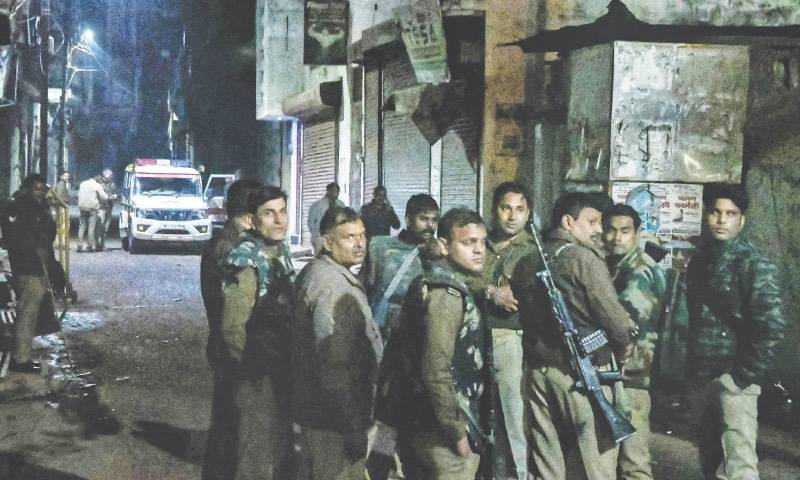Deadly Violence Erupts in Uttar Pradesh Over Mosque Survey, Tensions Escalate
Authorities in Sambhal district, Uttar Pradesh, have imposed a heavy crackdown following deadly violence sparked by a survey of the Shahi Jama Masjid, a Mughal-era mosque. Police arrested dozens of individuals, shut down internet services, closed schools, and heightened security measures as the unrest intensified.
At least four people were killed during the violence on Sunday, including three Muslim men—Naeem, Bilal, and Noman—who were shot during clashes with the police. A 19-year-old man later succumbed to his injuries. Reports suggest that the violence began after a group opposed the court-ordered survey of the mosque, which was authorized after a petition from eight plaintiffs, including pro-Hindutva lawyer Hari Shankar Jain, who argued the mosque was built on the site of an ancient Hindu temple.
Authorities Respond to Growing Unrest
Local authorities, including Senior Police Officer Aunjaneya Kumar Singh, have closed all schools and colleges, banned public gatherings, and prohibited outsiders from entering the city without official permission until November 30. A state of heightened alert has been declared, as police aim to contain the volatile situation. At least 25 people have been arrested, and complaints have been filed against around 2,500 individuals, including local Member of Parliament Zia-ur-Rehman Barq, who has been accused of inciting the violence—a charge he denies.
Survey of the Mosque: Community Divisions Deepen
The controversy surrounding the Shahi Jama Masjid survey stems from deep-rooted communal tensions. The court’s decision to conduct the survey was seen by some as part of an ongoing effort to assert Hindu claims over Muslim-majority sites, a sentiment stoked by the belief among some Hindu groups that many mosques were built atop ancient Hindu temples during the Mughal era. The local Muslim community fears that the survey could be a precursor to a wider effort to alter the mosque’s status.
The first survey on November 19 took place without incident, but the second round on Sunday saw violent protests. Demonstrators clashed with police, throwing stones and setting vehicles on fire. Police responded with tear gas and live ammunition, leading to several injuries among officers and protesters. Video footage circulating on social media captured the chaos, with scenes of stone-throwing, burning vehicles, and police firing weapons.
Reactions from Political Leaders
The violence has prompted strong reactions from opposition politicians and activists, who accused the Bharatiya Janata Party (BJP) of orchestrating the survey to deepen divisions between Hindus and Muslims. Akhilesh Yadav, leader of the Samajwadi Party (SP) and former Chief Minister of Uttar Pradesh, condemned the violence, stating that the state government was responsible for the unrest. Congress Party officials have called for a judicial inquiry into the incident, with state Congress chief Ajay Rai describing the killings as a result of the BJP's "politics of hatred."
Asaduddin Owaisi, leader of the All India Majlis-e-Ittehadul Muslimeen (AIMIM), expressed outrage over the police killings, describing them as "murder," and criticized the court’s decision to order the survey without consulting the mosque's caretakers. He pointed out that the mosque is over 200 years old, and the judicial process had been conducted hastily.
Historical Context: Religious Tensions in India
The Shahi Jama Masjid dispute is just one in a long history of religious tensions in India, often triggered by disputes over historic religious sites. The incident echoes the 1992 demolition of the Babri Masjid in Ayodhya, which sparked widespread communal violence and led to nearly 2,000 deaths, mostly among Muslims. The subsequent rise in Hindu nationalism has been closely associated with Prime Minister Narendra Modi’s tenure, particularly following the inauguration of a controversial Hindu temple at the Babri mosque site earlier this year.
Critics argue that the mosque survey runs contrary to the intent of The Places of Worship (Special Provisions) Act, 1991, which prohibits the alteration of the religious character of places of worship in India as they stood on August 15, 1947, the day of India’s independence.
Conclusion: Growing Religious Divisions
The violence in Sambhal reflects a broader pattern of religious division that has deepened under the BJP-led government. Hindu nationalist groups, emboldened by Modi’s policies, have increasingly sought to reclaim sites they believe were once Hindu temples. However, many Indian Muslims fear that these efforts are aimed at undermining their religious and cultural heritage.
With the situation still volatile, the incident has reignited debates over the role of religion in Indian politics, the protection of minority rights, and the state’s commitment to secularism in a country with a significant Muslim population.




No comments yet
Be the first to share your thoughts!